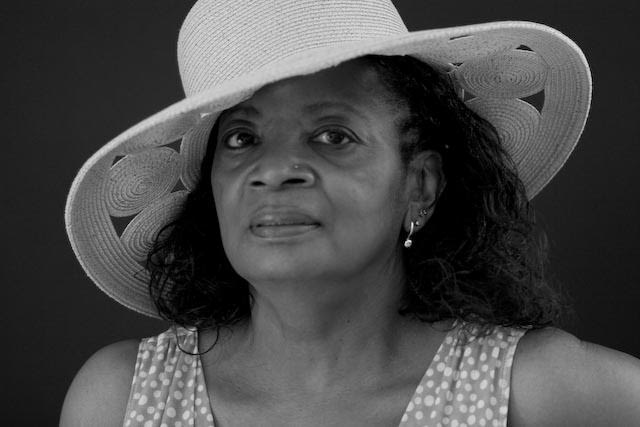
Blood Memory
Colleen J. McElroy
(University of Pittsburgh Press)

Most poets don't get it. They don't know how to grab the reader around the neck, spin her around, spitting out gall and wormwood, all the time yanking down the stars and the moons, dragging them (and us) through the muck of the day-to-day - - - and all the while pulling in those dulcet elements out of the childhood of all of us, the memories that drag us back into the time when we were living out our innocence, now knowing that we could ever be addressed in the past as if it were sliced out of the freshness of the present. Most poets, as I say, don't get it.But McElroy does. For what she crams into the pile is the full memory of, for example, her mother "fighting the world she fought herself," then she - - - the poet - - - at the movies at Antioch "when we were Colored / before we were Black." There's Cousin Viola playing the piano "making a whole lotta racket," men in a porter's suit not knowing they are degraded, "still men answering / to the call of Boy;" her father being cursed as "that man [who] never did a thing for you."
And then she is remembering Nellie Lutcher's "real gone guy" and I am remembering the very same Nellie Lutcher from the late night blues station as she pounds the keys singing
Oh he is real gone, real gone,
Real gone, he is real gone,
He's a real gone guy and do I love him?
'Deed I do!even though
Sometimes he hurts me with his line of jive,
Yes, sometimes he hurts me with his line of jive . . .All of which set me up to thinking about Lutcher's best song from 1947, the one we thought was the most edgy (in those times it was considered risqué to even hint of lust), when she begged her love to
Hurry on down to my house, baby
Ain't nobody home
Haul it down, drag it down
Any way to get it down
I'm blue as I can be
Ashes-to-ashes. Dust-to-dust
C'mon, honey, you must, you must!
Hurry on down to my house, baby
Ain't nobody home but meAnd Lutcher crying out the lines
"you must
you must."§ § § McElroy's memories are thus tuned to some of our favorites, and, too, they are filled with a gentle bittersweet given those of us who grew up around (but not in) her world . . . always her family and her living with the endless Hobson's choices:
like her father "before his despair caught my mother / in the crossfire between blues and retribution"
. . . or when cousin James joined the St. Louis police force, McElroy's mother asking his mother, worried he'd become
like the white ones who entered without invitation
searching every nook and cranny for something
wrong when everything in the house was right.Blood Memory sports over fifty poems, and for those of us who grew up nearby, they ring true in a world so full of wrong, one that supposed separate but equal but was never equal except for those who made the rules, leaving the rest the double whammy of being black and a woman so that McElroy, as a child,
just flat out couldn't understand
what all that weeping was about
while I tried sneaking
a taste of cherry spiked drink
tried listening as Aunt Jennie said
baby, men come on like busses
another stop along by and by
Jennie a little tipsy
filling everybody's cup
until the punch bowl emptied
and my mother eating all the fruit
because she didn't drink when
for a time she was single again
waiting by the side of the road.McElroy, with her warmth, and the dark memories reminding us of the same semi-sweet bitterness of Patricia Smith's Shoulda Been Jimi Savannah, her mother's droll reaction, the reaction of one who had been lied to so much by the white world, suspecting even an all-white moon shot,
No man gon' reach
down, just scoop up moon, even if Mr. Cronkite say he did.
Them white men way out in a desert somewhere, stumbling
round in them blowed-up suits with movie stuff back a' them
laughing inside those glass heads.§ § § It is a matter of valuing the angry bitter often wistful often harsh collection of memories of family between those who had their shame tied up into their locks, where
Mama said in slavery times every
little girl's hair was cut short to keep folks
from guessing what man had fathered herso on Saturday nights, they spoke of "crinkly hair" and "flapper bangs" and "baby fine hair" but at the end of the evening they
swept the matted hair into a pie tin leaving
brown marks where the kinky knots had beenso rats wouldn't make a nest of it
so no one could make a nappy wig of it
so no-good folks wouldn't put a spell on them . . .And through it all there's still the memory of slavery "when colored folk / never owned so much as their names . . . " and she the "last female of a family / of women"
who wove the fabric
of stories into doilies and slip coversI am the child with sparrow legs
sock heels stuck halfway in her shoes
drinking the last of metaphors left
in teacups on the table unattended
--- Gini Washington